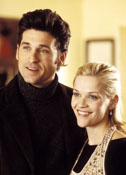
Movie Guru Rating:

Comment
on this review
| |

In Sweet Home, Alabama, the Civil War has a few more battles to go
by Jack Neely
This is the first movie review I've written for Metro Pulse, and I stand to scotch all hope for future credibility with this column. The first problem is that my first assignment was a movie called Sweet Home Alabama. The second, more serious, problem is that I liked it.
The movie does have some flaws, beginning with the plot structure. The opening scenes set up what looks like the central conflict: Melanie (Reese Witherspoon, of course), a successful young fashion designer in New York, accepts a proposal from rich, handsome Andrew (Patrick Dempsey), whose mother is the mayor, played by Candace Bergen—picture Martha Stewart as Mayor Bloomberg—who doesn't like the match and worries about its political consequences.
But then, for a good hour or so, we're left to wonder how the New Yorkers are getting along up there as Melanie goes south alone to take care of a legal detail: the fact that she's still married to her childhood sweetheart, Jake (Josh Lucas), the secret husband from whom she has been estranged for years, but who has repeatedly refused to sign divorce papers. On that expedition, she re-enters a world she had all but forgotten.
Some have protested the movie's unjust stereotypical portrayals of Southerners as beer-swilling, pickup-driving, La-Z-Boy reclining good ol' boys, and I agree that the portrayals were, in some ways, unjust. For the most part, they seemed unjustly flattering. The actors, even the extras, have better haircuts than most Southern men do; in a scene of a poolroom crowded with Southern men under 45, there's only one discernible mullet. Some, but fewer than half, are wearing ball caps. And the male actors appear to be, on average, 40-60 pounds slimmer than the average Southerner of comparable age (I saw this movie just before attending the Vols game).
The honky-tonk band, which has a taste for old-time country and r&b styles, is better than any real honky-tonk band I've ever heard. The big, airy honky tonk itself is better-looking than most of the dark, bombproof bunkers that pass for bars in much of the South— outside of New Orleans, at least. This is an idyllic South where Southern men dress differently from each other, drive vintage cars, like good music, and—get this—avoid light beer.
This is not a documentary about rural Alabama or any other part of the South in 2002: There's no four-lane, no Wal-Mart, no Chem-Lawn McMansions, no parking lots full of SUVs. The movie's South is a place more of coon-dog cemeteries and fried pickles and catfish festivals, Civil War reenactments to anvil shoots. (That last item might have seemed unrealistic if I hadn't witnessed the practice at some of John Rice Irwin's Homecoming parties up in Norris.) If it's stereotypical, it's also more appealing than any random assemblage of Southern reality, which has a whole lot to do with fluorescent lights, air-conditioning, and asphalt. The local bank doesn't have an ATM because the bank president believes in encouraging personal relationships with his customers. In this movie, the often-maligned South is, for once, the good guy, a Shangri-La untroubled by Yankee notions of materialism and ambition.
One of the movie's producers is a real Alabaman, but you get the impression they thought they had to dress up the South a little to make it significantly different from New York and the whole rest of modern America and to make its lifestyle seem tempting to a successful young fashion designer who seems well-fixed in New York.
Comedies based on culture clashes are an old standby, of course, but the story that plays out in Alabama is a not altogether predictable one of a woman with, contrary to all assumptions, two pretty good choices. Reese Witherspoon is wonderful, and maybe necessary, in this role. I could trot out the usual adjectives to describe the Nashville-raised actress Touchstone describes as "America's Sweetheart": luminous, incandescent, captivating, etc., etc., but you've heard them before. Her character is not entirely coherent (is yours?), but, for that, seems more real.
The movie itself is a "romantic comedy," which might perplex some who have grown to expect certain developments in any movie described thus. Most Hollywood romantic comedies in the last quarter century might aptly be retitled Humping Someone New. In Hollywood, that theme is a carefully observed dramatic verities. Alabama ignores it; it's a rare and, on some level, even realistic look at marriage. Near the end, there's an innovative use of a busted pair of Rock'em Sock'em Robots that might make you weep. It occurred to me about halfway through that this is The Philadelphia Story, warped and sideways, with fried pickles on the side.
This movie isn't as funny as that one; there's less witty dialogue than loony character-based unpredictability. But the script includes a good many fine lines: my favorite, which is worthy of Bartlett's, is delivered by Melanie's father (Fred Ward) who is, at the moment, standing in his double-wide dressed as a Confederate cavalry officer and surprised by a question about why he's on his way to a reenactment. "History's history," he says. "No use sweeping it under the rug."

October 3, 2002 * Vol. 12, No. 40
© 2000 Metro Pulse
|





